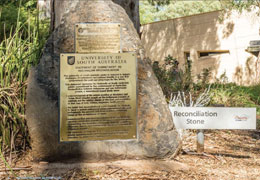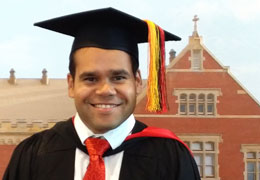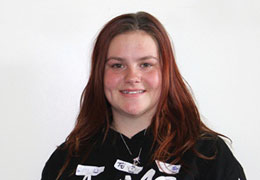View as a PDF (500KB) or read below.
1968
ABORIGINAL STUDIES IS TAUGHT AT THE TEACHER EDUCATION CENTRE (WESTERN TEACHERS COLLEGE)
1973
THE TASK FORCE – AUSTRALIA’S FIRST INDIGENOUS TERTIARY PROGRAM IS ESTABLISHED (SOUTH AUSTRALIAN INSTITUTE OF TECHNOLOGY)
Reflections from Professor Paul Hughes, AM, FACE
Emeritus Professor, UniSA David Unaipon College of Indigenous Education and Research
“In the 1970s after the national referendum amending our constitution had promised more rights to Aboriginal Australians, the mood for change in Australia was pervasive.
For Aboriginal people empowerment through education became central. The call was on to educate 1000 Aboriginal teachers by 1990 and a national program was set up to achieve just that with funds and support from the Commonwealth.
The Aboriginal Task Force established at the South Australian Institute of Technology in 1973 provided some of the first education in social work specifically for Indigenous students in Australia and the program was like a magnet for newly political Aboriginal youth who wanted to make a difference to their communities.
It was the first tertiary program of its kind in Australia and provided an enclave of support for its students and a path forward that encouraged careers built on education.
The Torrens College for Advanced Education’s Teacher Education program for Aboriginal students established in 1978 was also significant.
After being active on the National Education Committee and the Chair of the SA Aboriginal Education Consultative Committee, I was pushing very hard to win support for educational opportunities.
I chaired the planning committee for the Task Force and ran that first Teacher Education Program and there was a real spirit of empowerment and achievement.
It was only the third teacher training program for Aboriginal people in Australia, but our State became a leading exponent of how to do it well.
The combination of academic and cultural support and the sense of commitment to student success made it a great place to study.
It’s from those roots that the University built a commitment to Indigenous education and to the inclusion of Indigenous knowledge and research in UniSA’s curriculum, culture and consciousness.”
1984
THE ANANGU TERTIARY EDUCATION PROGRAM (ANTEP) COMMENCES
1988
THE SCHOOL OF ABORIGINAL AND ISLANDER ADMINISTRATION (SA INSTITUTE OF TECHNOLOGY) IS ESTABLISHED
1991
UNIVERSITY OF SOUTH AUSTRALIA ACT INCLUDES THE FUNCTION: “TO PROVIDE SUCH TERTIARY EDUCATION PROGRAMMES AS THE UNIVERSITY THINKS APPROPRIATE TO MEET THE NEEDS OF THE ABORIGINAL PEOPLE”
1996
THE UNAIPON SCHOOL IS FORMED
1997
UNISA IS THE FIRST UNIVERSITY IN AUSTRALIA TO MAKE A STATEMENT OF COMMITMENT TO AUSTRALIAN RECONCILIATION
Reflections from Professor Eleanor Ramsay
Former UniSA Pro Vice Chancellor (Equity and Development)
“One of the first big public events staged at the University’s new City West campus was the 1997 forum on reconciliation. Then the UniSA Pro Vice Chancellor for Equity and Development, I was honoured to organise this event in consultation with my Indigenous colleagues.
The venue was packed with UniSA staff and students, as well as people from the wider community, including some of the most highly respected Indigenous leaders and activists on the state and national scene.
Amongst the speakers were national and international experts in the area of reconciliation, including the Reporting Commissioner for the Aboriginal Deaths in Custody Royal Commission, Elliott Johnston, and the Vice Chancellor of Nelson Mandela’s former university, Fort Hare in South Africa. Our own senior Aboriginal educators and Aboriginal Elder Lewis O’Brien were also at the centre of the event.
The discussion left us all with the strong sense that more needed to be done to begin the process of reconciliation in a more positive and enduring way within the University itself, with actions not just words. Our predecessor institutions had been national leaders in Aboriginal education, a legacy which the new University continued proudly, including explicitly in its founding legislation.
But what about the rest of the University? In what way was our research and our teaching influenced by this proud history and enduring legacy, if at all? These questions and the insights gained from the Reconciliation Forum led to the decision to develop and adopt the University’s Reconciliation Commitment Statement, the first such public commitment to reconciliation action made by any university in the country.
The UniSA student union showed its own commitment to reconciliation by developing and gaining approval for the establishment of a series of UniSA Reconciliation Rocks, each with a metal plaque carrying the words of the University’s Reconciliation Commitment Statement.
 With one rock on every campus, the rocks showed our shared commitment to action in a tangible and enduring way. As the then Vice Chancellor Professor Denise Bradley said at the inauguration of the Reconciliation Rock at the City West campus, “within the University we firmly believe that a mutual respect for and a willingness to understand our history is essential if Australia is to heal the wounds of the past and undergo a process of national renewal which will allow us to look outward to the world as a strong, confident and harmonious nation.”
With one rock on every campus, the rocks showed our shared commitment to action in a tangible and enduring way. As the then Vice Chancellor Professor Denise Bradley said at the inauguration of the Reconciliation Rock at the City West campus, “within the University we firmly believe that a mutual respect for and a willingness to understand our history is essential if Australia is to heal the wounds of the past and undergo a process of national renewal which will allow us to look outward to the world as a strong, confident and harmonious nation.”
2000
THE INAUGURAL IRENE AND DAVID DAVY SCHOLARSHIP FOR THE ADVANCEMENT OF ABORIGINAL EDUCATION IS AWARDED
Reflections from Trevor Ritchie
Bachelor of Applied Science (Occupational Therapy) graduate and 2013 Irene and David Davy Scholarship recipient
 “As the first identified Aboriginal person graduating with an occupational therapy degree in South Australia I have a passion to lead and support other Indigenous allied health professionals to follow in my footsteps.
“As the first identified Aboriginal person graduating with an occupational therapy degree in South Australia I have a passion to lead and support other Indigenous allied health professionals to follow in my footsteps.
I am also passionate about education and I hope to promote the recruitment and retention of Aboriginal students at university, and to enable more Aboriginal professional health workers in our communities.
My personal aim is for my son and my son’s community to have a better life than mine.
It’s easy to feel overwhelmed by the enormity of closing the gap in Aboriginal health inequality but I’m committed to playing my part.
The scholarship I received in the final year of my degree significantly helped me on my journey by providing important financial security while I was on placements.
Scholarships can make a huge impact on the lives of people who may not have the opportunity for higher level education without that type of support.”
2005
GAVIN WANGANEEN SCHOLARSHIP, ONE OF A NUMBER OF SCHOLARSHIPS SUPPORTING ABORIGINAL AND TORRES STRAIT ISLANDER STUDENTS, IS INTRODUCED
Reflections from Gavin Wanganeen
The Gavin Wanganeen Indigenous Scholarship Patron, footballer, Brownlow Medallist and first Indigenous AFL Life Member
 “Role models can make a difference to people’s lives. I believe it’s so important for Indigenous children to have a range of role models out there – role models in sport, in education, in health, in business, and any number of other areas.
“Role models can make a difference to people’s lives. I believe it’s so important for Indigenous children to have a range of role models out there – role models in sport, in education, in health, in business, and any number of other areas.
Children need to have people they can look up – it’s a way of helping them realise they too can achieve anything they want in their life. I know in my career as a footballer, I looked up to people that had gone before me and they inspired me to keep going.
Scholarships are important because they can help break down the barriers to education and give more Indigenous students the chance to attend university. These students can then go on and contribute to our community, becoming leaders in their own fields and at the same time, provide an example for all the Indigenous children following in their footsteps.”
2010
UNISA COLLEGE IS ESTABLISHED, PROVIDING PATHWAYS FOR ABORIGINAL AND TORRES STRAIT ISLANDER STUDENTS
INDIGENOUS GRADUATE TRAINEE PROGRAM COMMENCES
PROFESSOR PETER BUCKSKIN IS APPOINTED INAUGURAL DEAN OF INDIGENOUS SCHOLARSHIP, ENGAGEMENT AND RESEARCH
2013
THE AUSTRALIAN INDIGENOUS MENTORING EXPERIENCE (AIME) PROGRAM STARTS AT UNISA
Reflections from Bianca Williams
Year 10 high school student and AIME mentee
 “The AIME program is about identity and finding yourself. It’s about how you as an individual and an Aboriginal person can succeed in life.
“The AIME program is about identity and finding yourself. It’s about how you as an individual and an Aboriginal person can succeed in life.
I’ve always wanted to go to university and since I was seven, my goal has been to get a doctorate specialising in marine biology. AIME is helping me prepare for what’s going to happen and give me a better understanding of university life. It’s a good stepping stone.
I’ve learnt that support is never far away – it’s just about making that step to go up to someone and ask for help.”
NEW VICE CHANCELLOR RECEIVES A WELCOME TO COUNTRY
2014
THE UNIVERSITY’S RECONCILIATION ACTION PLAN (RAP) IS LAUNCHED
Reflections from Professor Esther May
UniSA Dean: Health and Clinical Education in the Division of Health Sciences and Co-chair of the RAP steering group
“UniSA developed a RAP because it became clear over time that the University community wanted to build an institution that was a University of Choice for Aboriginal and Torres Strait Islander students and staff.
This desire was underpinned by a commitment from the Chancellor and Vice Chancellor to support a participatory and meaningful process that brought together Aboriginal and Torres Strait Islander people and other Australians – and the RAP was a good mechanism to achieve this.
The development of the RAP made us examine what was important in bringing about better understanding of Aboriginal and Torres Strait Islander knowledge, identity and culture and how we could instil a common direction in building relationships, respect and opportunities between Aboriginal and Torres Strait Islander colleagues and students and others.
The RAP has given that direction and in 2015 work will begin on the next iteration of the RAP, building on the good foundation of the first UniSA RAP.”
View the RAP on the UniSA website (PDF).
DEADLY ALUMNI CHAPTER IS ESTABLISHED
Reflections from Dr Tom Calma, AO
Honorary Doctor of UniSA, Patron of the Deadly Alumni, Chancellor of the University of Canberra
“Through its members UniSA’s Deadly Alumni Chapter highlights all the possibilities education can provide and all the benefits of empowerment that education offers for Aboriginal and Torres Strait Islander people. Success breeds success and the more we can highlight Aboriginal and Torres Strait Islander success stories, the more we light the way for the next generation.”